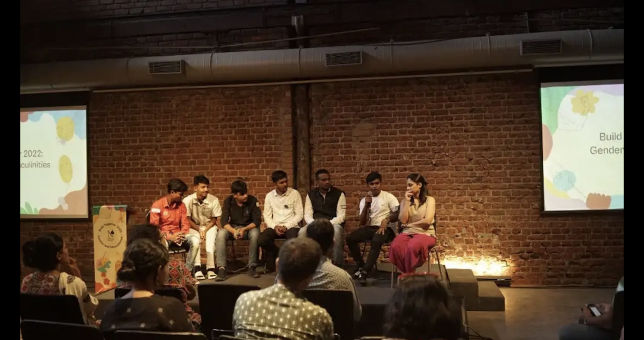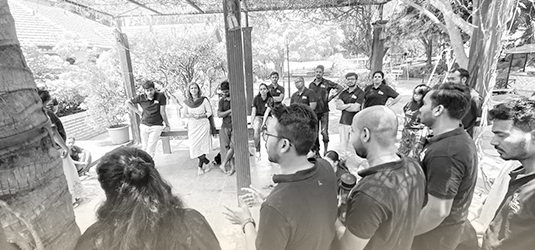Twenty days into joining the Rohini Nilekani Philanthropies (RNP) team, I found myself hunting for green chutney across Mumbai streets. No, we were not hosting a pop-up dinner in the city as much as I would have enjoyed that. But I can tell you, it was part of the mise en place for something more exciting, which the team had been cooking for a while.
Two years into the pandemic, RNP was hosting its first in-person gathering (September 2022) for those engaged in the gender and masculinities space. The objective was to create a safe space for our community to share, celebrate, and ideate while building together a gender-equal world.
Of course, our participants had feedback — most prominently, to go beyond the comfort of the English language to bridge accessibility gaps and to create more opportunities for organizations to share their experiences.
A room full of people from over 35 civil society organisations and five donors converged at the gathering. We acknowledged each other to say that all those working day in and day out were not alone. We celebrated the resilience of civil society organizations and their people to thrive through a spate of challenges befalling everyone and this sector in particular. We also spent time thinking through what should be done to continue moving the needle. The choice of
the name for our gathering, ‘Build Together’, translated well for all present in that room.
If you are wondering what happened to all that chutney I bought, worry not — we got some of our participants to make sandwiches for everyone. Meanwhile, some others were busy making gender-neutral ads for specific products or imagining buildings of the future using Legos. It was a conscious choice to include a fair amount of play throughout our gathering while being steeped in our values since there’s evidence of how it makes one feel liberated rather than have two intense days of cerebral overload. Similarly, since art and culture extend significant influence over gender work, the agenda also included a soulful musical evening with two artists, Bindhu Malini and Vedanth Bharadwaj, as well as a screening of the short film ‘Natkhat’, written by Annukampa Harsh and Shaan Vyas and starring Vidya Balan.

While spluttered with a lot of play and leisure, both days also had their share of serious, meaningful conversations. Centre for Health and Social Justice (CHSJ), supported by the ATE Chandra Foundation, presented their research on the impact of interventions with men and boys on the prevention of gender-based violence; EMpower hosted a conversation on participatory approaches, which saw four young women take the stage to share their experiences, struggles, and dilemmas; UNICEF along with Breakthrough and Jatan shared their learnings on translating action into policy. Veteran journalist and author, Rajni Bakshi, also spoke briefly on ahimsa and men drawing on her years of expertise in Gandhian thought. In an attempt to envision a collective future, Socratus facilitated a fun yet insightful exercise by building a Twitter of the future, and Yuvaa shared with the room the many interesting ways in which they engage the youth of India through a session called ‘Men Ki Baat’. Last but not least, in any manner, we also had an open mic with a group of young men and boys in attendance to hear their experiences and takeaways from the gathering.
Beyond many a conversation and delicious food, an installation (or ‘gram corner in the words of my very millennial colleague) was put up at the venue that kept everyone engaged through the two days. This was the result of a study RNP commissioned Cracker and Rush to check in on young men and boys in urban India, which highlighted the immense pressure they face to perform or be Laayak beneath the apparent privileges.
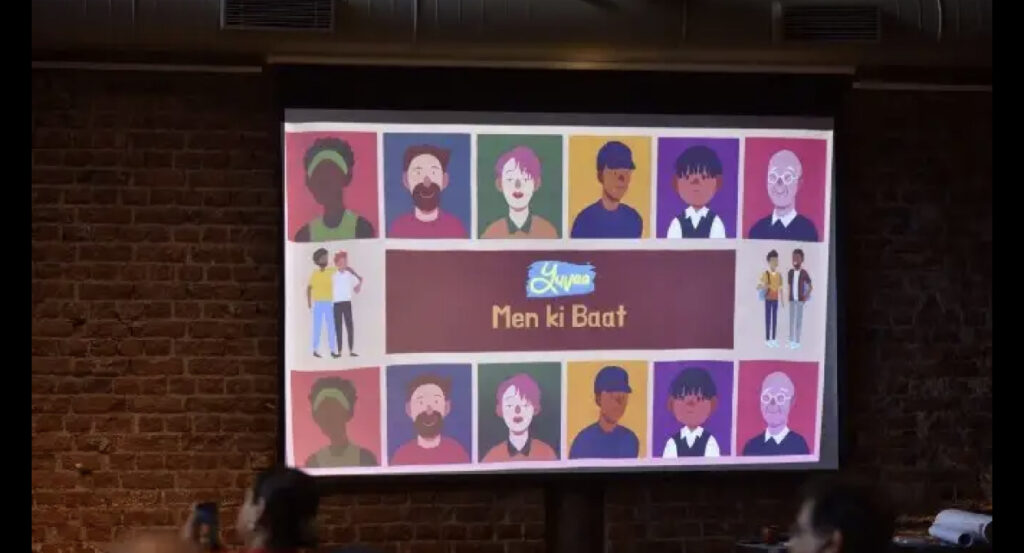
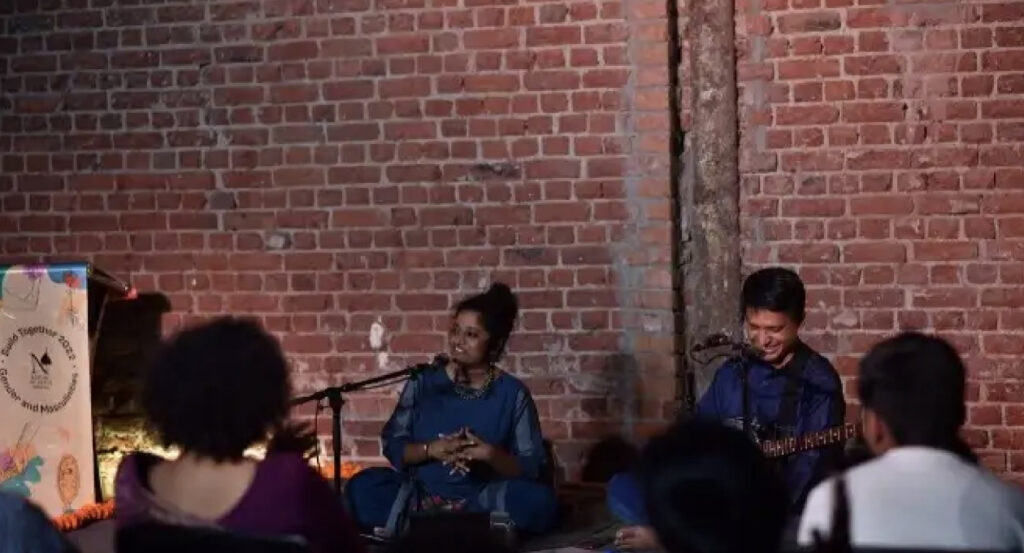
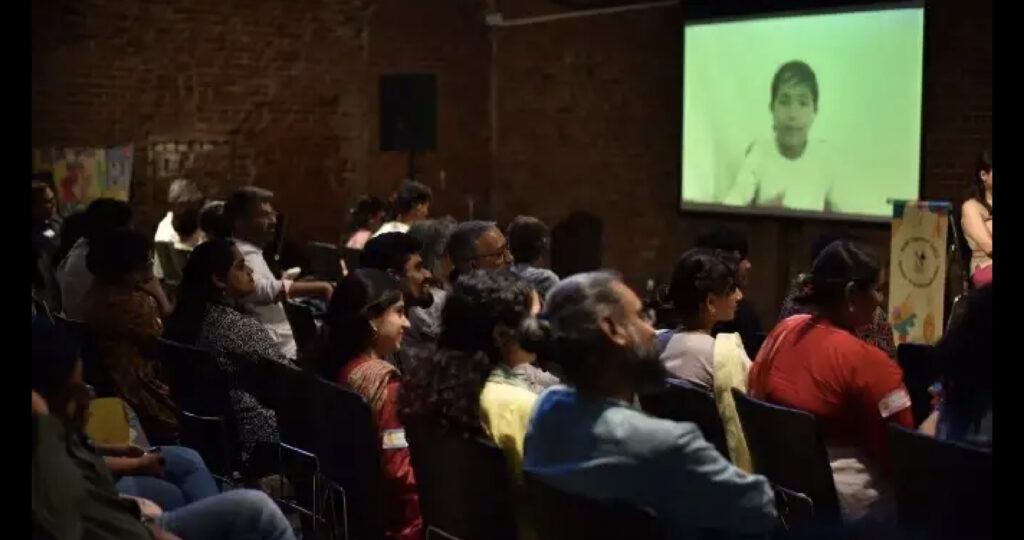
It’s not to say that the gathering was perfect in all respects. Of course, our participants had feedback — most prominently, to go beyond the comfort of the English language to bridge accessibility gaps and to create more opportunities for organizations to share their experiences. We have heard this and will make an intentional effort to improve on them going forward.
It was certainly the best onboarding experience I could have asked for — not only did I get to meet some wonderful people and get acquainted with their work, but I came back with more questions about the fields of work than I’d gone in with, which is a great thing if you ask me. And if I were to summarise the key takeaways from the gathering for us as a team, they would be:
- Be purposeful about convening as inclusive and as diverse a gathering as possible: There is great merit in such rooms, from the many perspectives that are on offer and the solidarity that prevails despite these differences.
- Take play seriously: It acts as a wonderful fuel for building communities and collective ideation while offering heart-centred spaces.
- Never enough patient capital: There’s always room to do more, but change takes time — some changes, especially more than others. Our job as a philanthropy is to find ways to enable it.
